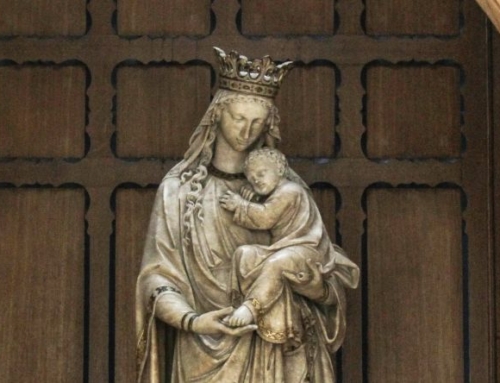A Simple House of Sts. Francis and Alphonsus. The New Evangelization: 2003–2013 Missionary Letters. Edited by Clark Massey. Washington: S&T Minuteman Press, 2013.
[Available at asimplehouse.org/newsletter. No payment is necessary but a donation of at least seven dollars to cover the cost of printing is encouraged.]
“I quit my job, sold my motorcycle, and poured my life savings into the founding of a small charity in southeast Washington, DC.” So writes Clark Massey in the first of forty-seven letters compiled in The New Evangelization: 2003–2013 Missionary Letters. Massey is the founder of A Simple House of Sts. Francis and Alphonsus, an organization dedicated to serving the poor in Washington, DC, and Kansas City, Missouri. As the title suggests, the book is simply a collection of the newsletters sent out five times a year to friends and family (and anyone else who is interested). Just over half of the letters in this short volume come from Massey’s pen, while the rest give voice to the insights and observations of nine other missionaries. The compilation of these letters into a single book allows for a beautiful, diachronic perspective on the unmistakable workings of divine providence over the ten or so years since A Simple House first took up its noble mission.
One need only read the letters of Blessed Pier Giorgio Frassati or Flannery O’Connor (others, of course, could be named) to learn firsthand that the profoundest insights into someone’s life, mind, and habit of being are often found in his letters; so, too, for this book. The reader quickly realizes that the heart of this small organization’s work is not at bottom a social agenda or mere material aid, but the spreading of the Gospel. This is not to say that the missionaries of A Simple House are ignorant of the societal problems that allow for the great depths of poverty so prevalent in southeast DC or that they scoff at the corporal works of mercy—far from it!—but, rather, that the purpose of their work, the end towards which they labor, is to bring people to Jesus, and this by what they call “friendship evangelization.”
In one letter Massey aptly quotes St. Paul as a kind of exemplar of this friendship evangelization: “So deeply do we care for you that we are determined to share with you not only the gospel of God but also our own selves, because you have become very dear to us” (1 Thess 2:8). For the missionaries of A Simple House, this sharing of their own selves is the context in which they serve the poor, cultivating authentic relationships which provide fertile ground for evangelization. It is also the pretext for their living an intentional life of fervent and frequent prayer and voluntary poverty, by which the missionaries imitate St. Paul in their becoming all things to all men that they might by all means save some (cf. 1 Cor 9:19–23).
The newsletters very frequently include anecdotes about interactions with the poor, thus giving the reader a privileged glimpse into the inner workings of this friendship evangelization. Often the stories are difficult and bleak, describing apparently insurmountable habits of sin (like a prostitute who was able to get off the streets for a while but, before long, found herself back there again), serious struggles with mental illness (like a homeless woman convinced her memories were not her memories), and even sudden and violent deaths (like a young man shot and killed mere hours after a visit from the missionaries, or an alcoholic who murdered his elderly neighbor with a hammer).
Aside from these exterior afflictions, the letters also unmask that insidious interior incapacitation of the will, despair. Perhaps somewhat surprisingly, this is one of the most important elements of the book, because it is here that the mission of A Simple House comes into full focus: the many and varied forms of material assistance they offer are ancillary to their fundamental goal, namely, to “rekindle hope through little stages of help and friendship.” It would be difficult to overstate the influence here of Mother Teresa, who observed, “We think sometimes that poverty is only being hungry, naked, and homeless. The poverty of being unwanted, unloved, and uncared for is the greatest poverty.”
The relationship between material and spiritual poverty lies at the roots of authentic Christian service to the poor, and it is implicit throughout the book as the driving force for the whole project, like a river’s constant current. It is often the materially poor who suffer the greatest spiritual poverty; after all, man is both body and soul. But with regard to spiritual poverty a further distinction could be drawn: there are those who are poor in spirit and inherit the kingdom of heaven (cf. Mt 5:3); and then there are those who are desolate and destitute in spirit, who feel empty and defeated and powerless in the face of their affliction. We read about the missionaries doing what they can to bring the latter group into the company of the former, to help dispose those who are hopeless and despairing to be transformed by grace into men and women awaiting the blessed hope and the coming of our savior Jesus Christ into their lives.
This brings us back to divine providence. The book is replete with utter reliance on God’s loving plan, because A Simple House is essentially a project of trusting in providence. They have renounced endowments and savings accounts, and as a rule they have no more than three months of operating funds on hand at any given time, though frequently they have less than that. To this end, a charming story is recounted which could come straight from the lives of the saints. At one point there was not enough money to keep operating, so the missionaries met to discuss how to go forward. Shortly after they prayed, the mail arrived and with it a check for ten thousand dollars.
The trust in God which fuels the life of A Simple House runs much deeper, however, than considerations of finance. It is bound up with the mystery of suffering, personal weakness, and the victory of Christ on the cross. Countless stories are told illustrating the interconnectedness of these towering themes, but the best summary is perhaps found in the account of the missionaries’ friendship with one man in particular, an alcoholic who drank thirty beers a day just to avoid feeling sick. At one point during his recovery, something as simple as bumping into an old friend at a gas station was enough to bring the reality of God’s abiding presence into sharper focus for him, and he cried out, “Tell me Jesus ain’t alive!”
After reading this moving collection of newsletters, I found myself exclaiming the very same thing—“Tell me Jesus ain’t alive!”—and praising God for the wonders of his love.
To download a printable PDF of this Article from
Dominicana Journal, Winter 2014, Vol LVII, No. 2, CLICK HERE.



